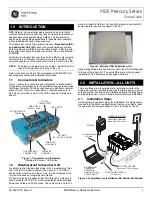
Powered Transmitter Hookup Diagram
115/230
VAC
IP Camera
Coax from
Head-end
Link Port
Network
Port
9 - 56Vdc @ 0.4A
Power Supply
ET1500CB
Transmitter
ET1500CB Transmitter Installation:
Refer to the diagrams below when installing. Use best industry practices and follow all local building codes.
1) At the camera location, securely mount the Transmitter unit and accessories.
2) The Transmitter must be connected to an external power source in order to function, with a DC voltage range of 9 to
56 volts and capable of providing 400mA. A means of providing mounting and input power for the external power
supply is required to complete the install. Connect the DC power source to the Transmitter, by the attached twisted-
pair wires terminated in a screw terminal block. Note, the RED wire is for the plus/positive voltage while the BLACK
wire is for minus/negative voltage.
3) Find the coaxial cable from the head-end and make sure it is properly terminated 75 ohm type copper coax cable.
Connect the coaxial cable to the BNC jack of the Transmitter. If the Transmitter is powered up, the green POWER
LED on the “Network Port” will turn on. If the head-end unit is powered up, after about 15 to 30 seconds the green
10/100 (upper) LED at the “Coax Port” will turn-on to tell you that the head-end has connected with the transmitter
unit. The Ethernet device does not need to be connected for the transmitter to communicate with the head-end.
4) Finally, connect an Ethernet device to the Transmitter “Network Port”. The IP camera or other Ethernet device
should now be ready to operate. If all units are powered-up and communicating, the amber LINK STATUS LED on
the “Network Port” will turn on. Continue installing the remaining Transmitters as needed.
Connector
LED
OFF
ON
FLASHING
Network
Port
Power
(Green)
No Power
Power
Good
N/A
Link Status
(Amber)
No Ethernet
Link
Ethernet Link
Good
N/A
Link
Port
10/100 No
Link 100Mb 10Mb
PoE Out
No PoE
Power Out
N/A
N/A
LED INDICATORS




















